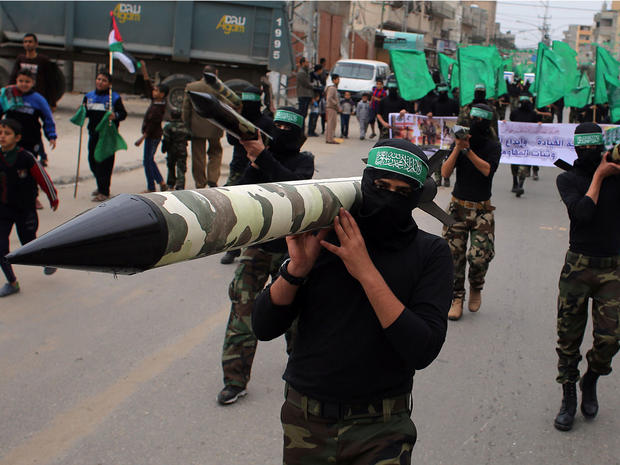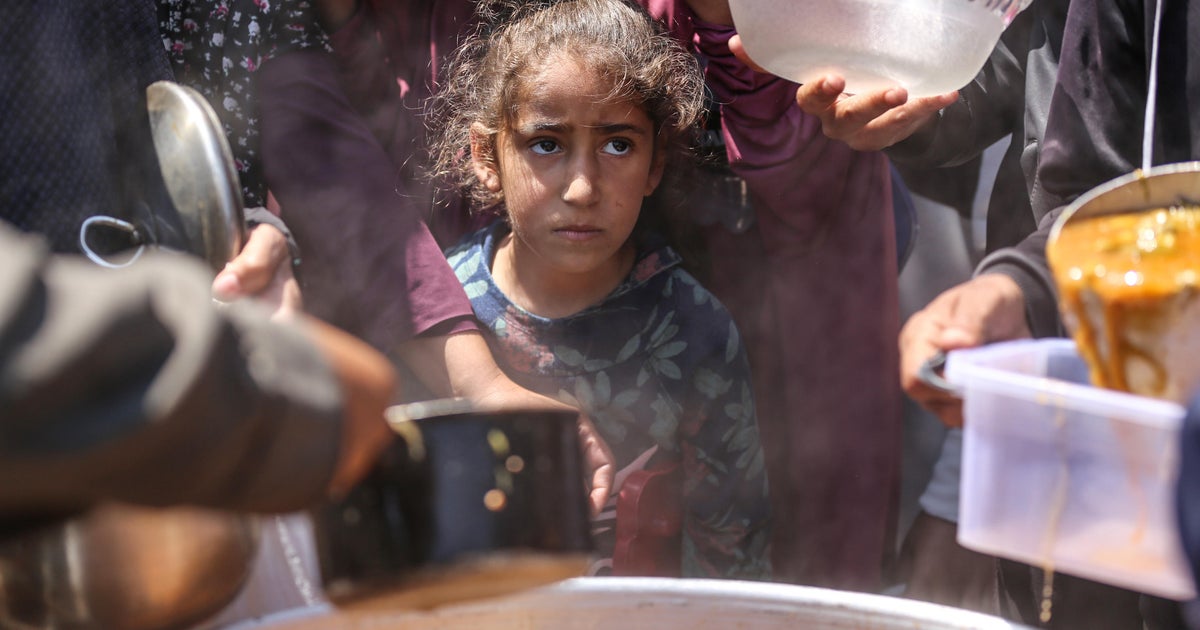Gaza tense amid fears that Israel-Hamas violence could reignite
Jerusalem -- A tense quiet has taken hold after a night of heavy fire as Israeli aircraft bombed targets across the Gaza Strip and Gaza militants fired rockets into Israel. Schools in southern Israel were shuttered on Tuesday following the violence that erupted just two weeks ahead of Israeli elections.
The Israeli military imposed restrictions on public gatherings near the Gaza border after dozens of rockets were fired toward communities in the area, including one that struck a house in the town of Sderot. The violence escalated quickly on Monday after Israel accused Palestinian Hamas militants of firing a rocket that hit a home near Tel Aviv, deep inside Israeli territory.
In retaliation the Israeli air force pounded militant sites of Gaza's Hamas rulers and the smaller Islamic Jihad group. The targets included a multistory building in Gaza City that Israel said had served as a Hamas military intelligence headquarters and the office of Hamas leader Ismail Haniyeh. The airstrike was so powerful it sent debris flying onto the roof of The Associated Press bureau on the 11th floor of a nearby high-rise.
Gaza's Health Ministry said seven Palestinians were wounded in the airstrikes.
CBS News correspondent Seth Doane was in the Israeli town of Sderot, where some of the rockets from Gaza landed. Israel's military has said at least 60 rockets were fired from Gaza overnight. Doane said people on both sides of the border were still on high alert Tuesday with schools closed, bomb shelters open and troop reinforcements being sent toward the Gaza-Israel border. On the way to Sderot, Doane and his team saw Israeli military convoys on the road, and armored vehicles massing in fields.
Political pressure on Netanyahu
The attack prompted Prime Minister Benjamin Netanyahu to cut short a visit to Washington and return home. He promised a tough response, setting the stage for perhaps the most serious conflict since a 50-day war in 2014.
The increased hostilities come at a time when both Netanyahu and his Hamas foes are in desperate situations, with little incentive to de-escalate quickly.
Netanyahu is in a tight race for re-election against former army chief Benny Gantz. The prime minister is facing tough criticism from political rivals, including in his own right-wing political camp, who accuse him of being too soft on Hamas.
His visit to Washington lent him a boost, however, with President Donald Trump unilaterally recognizing the disputed and strategic Golan Heights, seized by Israel from neighboring Syria in 1967, as Israeli territory. Mr. Trump's move, which follows the trajectory set by his administration with the unilateral recognition of Jerusalem as Israel's capital last year, ends decades of U.S. Middle East policy refusing to formally recognize Israel's land-grab.
The U.N. Security Council in a December 1981 resolution called Israel's annexation of the Golan Heights "null and void and without international legal effect," and on Monday the U.N. said Secretary-General Antonio Guterres continued to adhere to council resolutions.
Syria called the move a "blatant aggression" on its sovereignty, and Lebanon, which Secretary of State Mike Pence visited over the past weekend, said the Golan Heights was "Syrian Arab" territory and that "no country can falsify history by transferring" land from one country to another. Even U.S. allies Canada and Turkey expressed opposition.
Hamas under pressure, too
Hamas, meanwhile, is under growing pressure domestically because of its failure to get Israel and Egypt to ease their Gaza border blockade, imposed after the 2007 Hamas takeover.
Haniyeh, the leader of Hamas, warned Israel against heavy retaliation. He said the Palestinian people "will not surrender" and its militant factions "will deter the enemy if it exceeds the red lines."
In Beirut, the powerful Lebanese militant group Hezbollah said its leader, Hassan Nasrallah, met Monday with a senior Hamas delegation. Hezbollah said they discussed the Gaza situation and "Israeli aggression."
Hamas is facing perhaps its toughest domestic test since seizing control of Gaza from the rival Palestinian Authority 12 years ago.
The Israel-Egyptian blockade, imposed to weaken Hamas, combined with sanctions by the Palestinian Authority and mismanagement by the Hamas government, have fueled an economic crisis that has left Gaza with an unemployment rate above 50 percent.
Hamas has been leading weekly protests along the Israeli border for the past year in hopes of easing the blockade, but the demonstrations, in which some 190 people have been killed by Israeli fire, have done little to improve conditions.
Last week, hundreds of Gazans protested the dire conditions, a rare expression of public discontent against the authoritarian government. Hamas responded with a violent crackdown, beating and arresting dozens of demonstrators and drawing rare public criticism.
The Monday rocket attack, which caught Israel off guard, may have been an attempt by Hamas to divert attention from its growing domestic woes.
Israel and Hamas' bloody past
Israel and Hamas have fought three wars. Although neither side appears to have an interest in another one, fighting could easily spin out of control.
The 2014 conflict lasted 50 days and ended with over 2,000 Palestinian deaths, including hundreds of civilians, and 73 killed on the Israeli side.
Netanyahu faces the difficult task of delivering a tough blow to Hamas while avoiding protracted fighting that could work against him on election day.
Monday's attack came 10 days after rockets were fired from Gaza toward Israel's densely populated commercial capital of Tel Aviv, and the Israeli military struck back. Gaza's Hamas leaders said the rocket was fired accidentally and the fighting quickly subsided.




